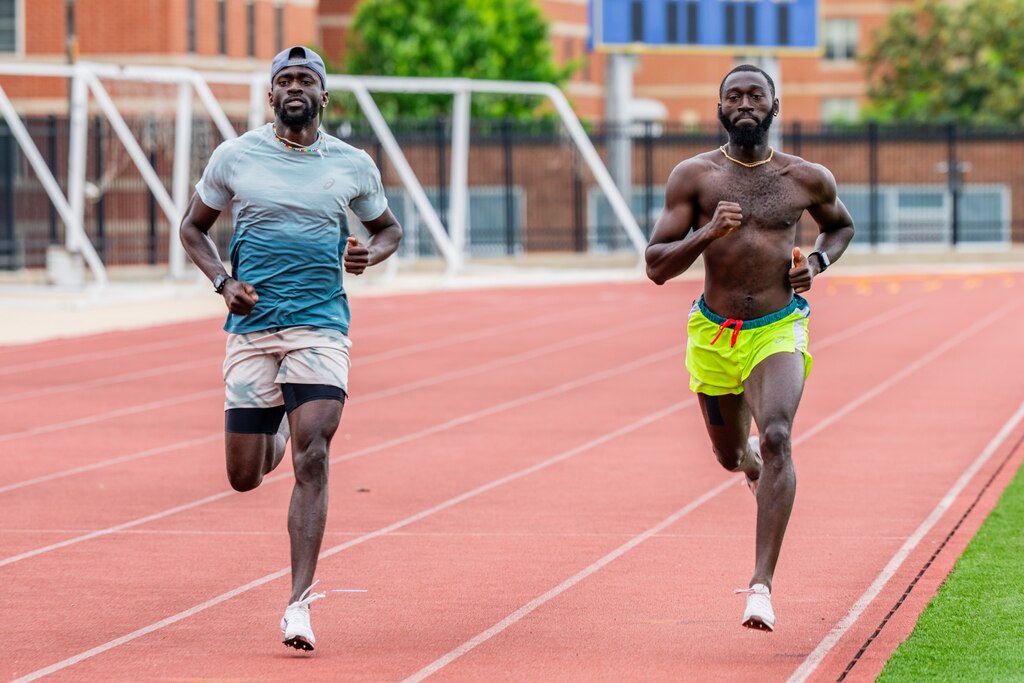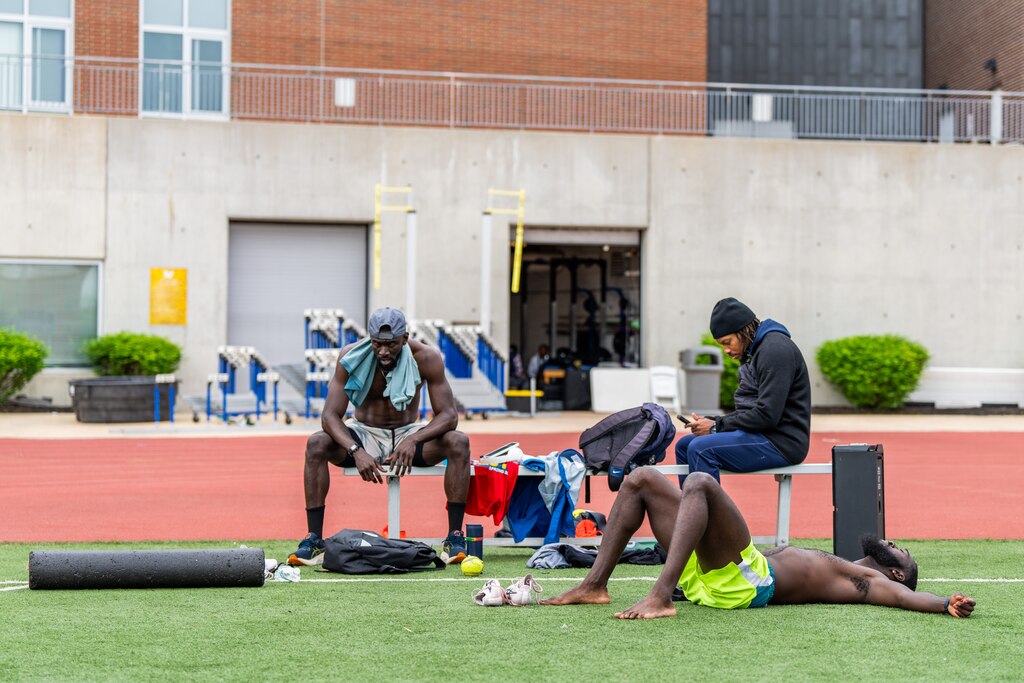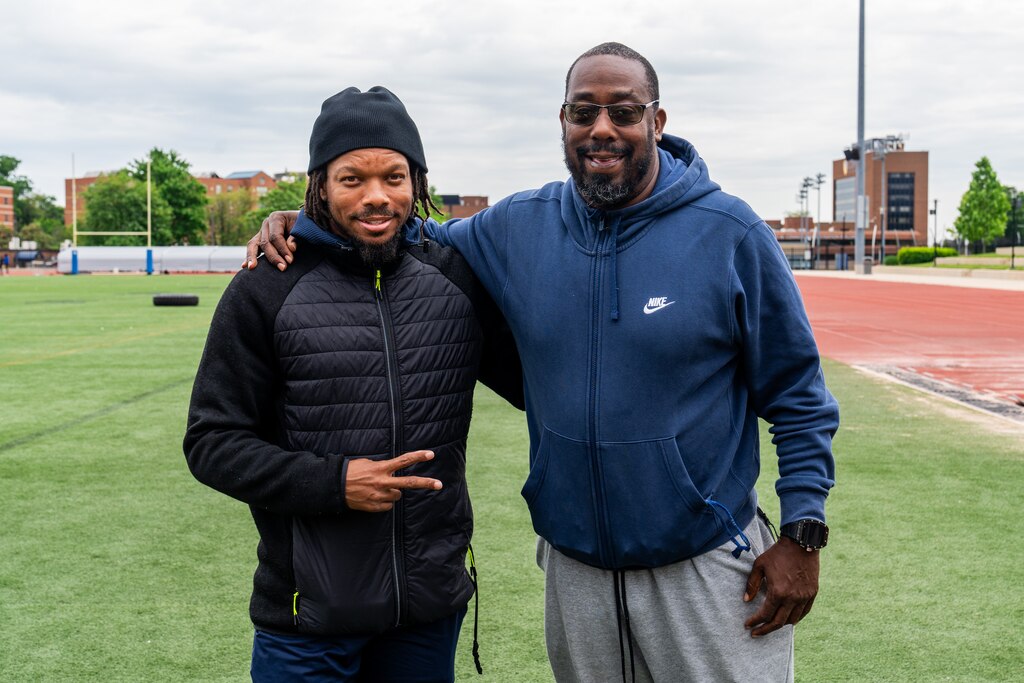Approach Joseph Amoah on the outdoor track at Coppin State University where the professional runner trains and he’ll often say “welcome to my office” as he tightens his shoelaces.
And, for all practical purposes, the track in Northwest Baltimore, where he can be found four or five times a week, has become his workplace.
Amoah and teammate Martin Owusu-Antwi are training together, and they hope to compete together in this summer’s Paris Olympics. Amoah already owns a place on Ghana’s 4x100 relay team, and he hopes to qualify in the 200 meters as well. Owusu-Antwi aims to make that relay team and qualify in the 400 meters.

The two continue to return to their alma mater to train with their old college coach, Jamie Wilson, who they say has a straightforward style that they appreciate. In turn, they give advice and sometimes volunteer with the up-and-coming runners on the historically Black university’s track team.
Wilson has high expectations for Amoah and Owusu-Antwi on and off the track. He recommends eight hours of sleep, eating right and hitting the weight room. He’s a stickler about athletes taking directions and listening when he gives notes about running forms that can affect their speed.
“We’re just blessed to be able to be here to see people that can take our talent to the next level,” said Amoah, who will be competing in the Olympics for the second time. Owusu-Antwi would be competing for the first time if he lands a spot on the 4x100 meter relay or qualifies for the 400 meters.
Getting to the next level requires intense training.
Owusu-Antwi curled up with a foam roller on the green artificial grass to catch his breath and rest his muscles after a recent practice that involved back-to-back sprints with only 30-second breaks.
He can almost always count on speed endurance, training that helps athletes sustain high speeds for longer periods, to put his body to the test.
When the whistle is blown, the quick pitter-patter of Amoah and Owusu-Antwi’s feet is accompanied by comments from Wilson to finish strong and watch their form.
Coach Carl Hicks, longtime head coach of the men’s cross country and track and field programs, also chimes in. “Mechanics is everything,” he said. And, he has no doubt Amoah and Owusu-Antwi are fast, but speed endurance is something they’ve continued to work on, especially because of the transition from the tropical climate in Ghana to the East Coast.
Owusu-Antwi often feels “dead from the workout” but, with more practice, he enjoys seeing his times get better.

Hicks said it was fate that he connected with Owusu-Antwi’s older brother nearly 10 years ago to learn about the athlete. Once he saw Owusu-Antwi’s stats, he had only one question: “How fast can we get him over?”
Coppin State “felt like a sense of community,” Owusu-Antwi said and, once he got settled, he was quick to recommend Amoah to Hicks as well. Owusu-Antwi received a social science degree in 2018 and Amoah an accounting degree in 2021.
Both men are on Ghana’s national team, which recently qualified for the Olympics in the men’s 4x100 meter relay at the World Relay Championship in the Bahamas. Amoah’s in that race as the anchor and Owusu-Antwi hopes to get one of the spots, as well. For the 200-meter and 400-meter races they’re training for, Amoah and Owusu-Antwi will need to hit 20.06 seconds and 45 seconds, according to the Olympics website.
Amoah and Owusu-Antwi’s times, which Wilson tracks during training, aren’t far off.
“They are on track to qualifying. Mainly execution is what we are trying to coach right now to make sure we hit the time,” said Wilson, whose teammates also call him “Coach Spice” because he is from Grenada, a Caribbean island known as the Isle of Spice because of its spice industry, especially nutmeg.
Wilson likes coaching the men because, in a sense, he is living his own dream through them. He too once wanted to take his running to the next level after he graduated from Coppin State in 2012. He did not have the consistent training and support to get there.
“After work is all fun and games, but when it’s time to work, you got to pick your A game because he’s gonna be on you the whole time,” Amoah said.
Owusu-Antwi said he always knew he was fast as a kid and pursued track like his three other siblings. It took a while because of the draining and exhaustive practices, but he fell in love with the sport. “It’s a sense of pride and accomplishment” for his family’s name to appear next to the Ghanaian flag when he races.
Amoah played several sports growing up, including soccer, volleyball and track. He started taking track seriously later in high school. His uncle, who also ran track, keeps him motivated.

Owusu-Antwi and Amoah have until the end of June to qualify for the 200 meters and 400 meters.
When Amoah participated in the Olympics in Tokyo, his team made it to the 4x100 meter relay final, but it was disqualified for a lane violation. Individually, he made it to the semifinal in the 200 meters.
Owusu-Antwi nearly qualified for the 200 meters in 2016 but missed the mark by 0.25 seconds, he said. A strained quadriceps muscle spoiled his chances to compete in the 2020 Olympics.
“I think mentally because of my past injuries, whenever it’s competition, I kind of hold myself back,” he said. But he’s working through that hurdle in therapy.
Amoah’s looking forward to seeing inspirational athletes from different sports all in one place at the Olympics. He’s not opposed to running into Steph Curry or LeBron James.
Amoah and Owusu-Antwi are on a literal one-track-mind mission with qualifying, but they also aspire for other professional advances that use their degrees. When they have downtime between training sessions, they tend to be homebodies and watch streaming services.
Amoah wants to continue his education and become a certified public accountant. Owusu-Antwi has two master’s degrees in cybersecurity and applied economics and wants to get a full-time job in information technology. He thinks he can squeeze in one or two more years on Ghana’s national team. The 29-year-old said he’s getting older and “you can’t run track for your whole life.” The extensive training also takes a toll on the body.
Nonetheless, Amoah and Owusu-Antwi view their years of experience with running as an opportunity to pass on what they’ve learned to the next generations, especially those on Coppin State’s track and field team. For Owusu-Antwi, he feels indebted to the historically Black university and Baltimore because of how he was welcomed and treated.
Amoah tends to advise younger runners that, no matter how small the school is, they should surround themselves with enough motivation to “push themselves to the next level.”
“One thing that my uncle and my dad always told me was it’s not about where you are. It’s about who you really are and trying to utilize the resources around you to be the best version of yourself,” Amoah said.



Comments
Welcome to The Banner's subscriber-only commenting community. Please review our community guidelines.